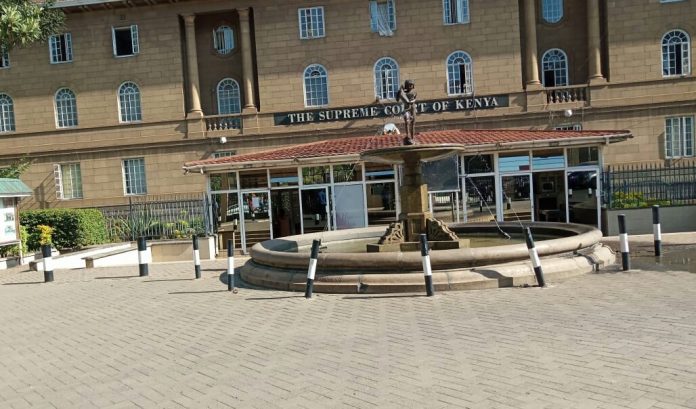It is a win for Kenya Commercial Bank Limited(KCB) after the Court of Appeal dismissed a suit by Benjo Amalgamated Limited in a 32-year loan dispute case.
Appellate judges Asike Makhandia, Kathurima M’Inoti, Sankale ole Kantai, Francis Tuiyott and John Mativo dismissed the application on grounds that it lacked merit.
Benjo had moved to the Court of Appeal to challenge a decision by the High Court and Court of Appeal on grounds of new evidence.
The dispute arose in 1992 when the suit was first filed at the High Court. This was after KCB sold a property charged to a Sh 18,675,000 loan granted to Benjo Ltd.
The court heard that sometime in 1988, the United States of America International Development (USAID) offered funds by way of loans to Kenyans under the Rural Projects Enterprise Programme to be administered by KCB amongst other banks.
The applicant (Benjoh), desiring to start a flower export business applied for a loan of Sh18,675,000 through KCB and after a feasibility study, KCB recommended the project and granted Benjoh the loan facility in 1989.
KCB, through lawyer Philip Nyachoti, submitted that the loan was secured by legal charges over two properties known as L.R. Nos. 12411/1 and LR No. 12411/2.
Further, upon request by KCB for further security, as a guarantee for the loan facility, a charge was created over L.R. No. 10075 owned by Muiri Coffee Estate Ltd.
The Auction
Later, Benjoh defaulted in the repayment of the loan prompting the lender to advertise and sell the properties by way of public auction.
Benjo and Muiri filed the first suit a day before the scheduled auction seeking to stop it and sought Sh 13,125,000 which they claimed they had lost in the process.
The suit was, however, compromised by the parties through a consent order recorded before Githinji, J. (as he then was) on 4th May, 1992 in which Benjoh admitted its indebtedness to KCB and undertook to repay the loan by 31st July 1992. In default, the consent order allowed KCB to proceed with the realisation of the securities.
Benjoh and Muiri failed to liquidate the loan as per the consent order and KCB again sought to realise the security through a public auction scheduled for 23rd January 1993.
Again, a day before the auction, Benjo filed another suit in Nairobi seeking to stop the auction but was later dismissed,
Over the years, Benjo and Muiri went on to file several other suits in different courts seeking to stop the auction.
The petitioners also prayed that KCB’s attempt to sell the charged properties be declared illegal and unconstitutional and the said properties be discharged and released to them.
Eventually, on 19th September 2007, L.R. No. 10075 was sold through a public auction to the highest bidder, Bidii Kenya Limited, the 2nd respondent, and it was registered as the proprietor.
Aggrieved by the decision, Benjoh and Muiri filed a case in 2008 against KCB and Bidii seeking to nullify the sale.
After unsuccessfully filing appeals to the Supreme Court, Benjo rerouted back to the Court of Appeal where seeking review of the court’s decision on grounds of discovering new evidence.
The alleged new evidence was an affidavit sworn by one Gideon Kaumbuthu Meenye on 21st December 2017 in which he disowned the consent recorded in court on 4th May, 1992.
It was submitted that Meenye was never engaged by Benjoh as its advocate in any proceedings before the court and that he did not have a practising certificate as at 4th March 1992.
The judges’ take
However, the five-judge bench wondered why during the numerous cases the applicant filed in the High Court and the Court of Appeal in which the applicant sought to set aside the consent, the applicant never, even in the slightest manner, alluded to the issues now being raised.
“The applicant now wants this court to believe that it took all those years to discover that it never instructed Mr. Meenye to represent it?” the judges questioned.
The bench added, “the applicant is suggesting that Mr. Meenye emerged from nowhere and actively represented it in court without its instructions?”
According to the judges, such assertions were the hallmark of dishonesty which should not find its way into the corridors of justice.
In addition, the judges found that Benjo was on one hand suggesting that there was no consent recorded, yet on the other it seemed to suggest there was consent but it was entered into by counsel whom they had not instructed and without its blessing.
“We, in the premises, find absolutely no merit in all the grounds cited in support of the review sought. Consequently, the prayer for review is dismissed,” the Appellate judges ruled.
In response to the application, KCB through, Nyachoti termed the application as grossly misconceived, misplaced, frivolous, mischievous, vexatious and an abuse of the court process.
He urged the court to be slow in exercising its residual jurisdiction to review its decision where there are laches or where legal rights have accrued in favour of innocent third parties which cannot be interfered with without causing injustice.
Nyachoti maintained that Mr. Meenye has always been available since 1992, adding that the issue of execution of the consent was dealt with by the court of appeal in its judgement of 10th March 1998.
He contended that it took Mr. Meenye over 20 years to swear the affidavit and added that Benjoh has not demonstrated how the said affidavit is new evidence to merit this court’s discretion.
He submitted that Mr. Meenye’s affidavit was not part of the evidence before the trial court, therefore it cannot be introduced at the appellate stage.
The lawyer further argued that the Appellate Court, vide a ruling delivered on 20th June, 2014 dismissed Benjoh’s invitation to review its judgement delivered on 10th March 1998 which Benjoh now sought to be reviewed again just because it was delivered before the promulgation of 2010 Constitution.
On the other hand, Bidii K. Ltd opposed the application by Benjo submitting that no explanation had been provided as to why it took over 20 years to procure Mr. Meenye’s affidavit that purports to discredit the consent orders recorded on 4th May 1992.
The court further heard that the firm of Meenye and Kirima Company Advocates is registered in Kenya and in the Law Society of Kenya’s database, therefore, Benjoh would not have had any challenge in locating Meenye to testify before the High Court; however, no attempts were made to get in touch with him until the delivery of this court’s judgement.
Bidii added that the instant application was prejudicial to them since allowing a party to introduce new evidence at the appellate stage is prejudicial to the opposing party and offends public policy and the law.
It was their submission that they were not a party to the consent and is just an innocent purchaser for value and the proprietary rights over the suit property have been vested in it for over 20 years.
Question is, will this be the final blow for Benjo Amalgamated Limited?










